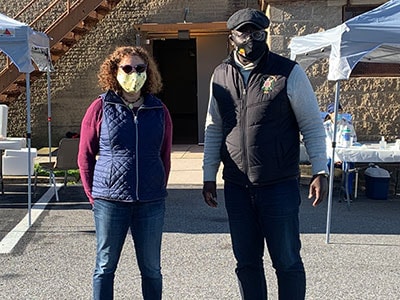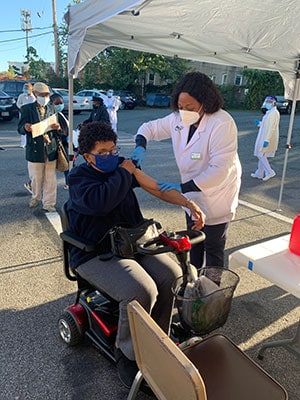Baltimore Coalition Introduces African American Community Campaign on the Importance of Getting a Flu Vaccine
Updated November 16, 2020

Rev. Dr. King with Lois Privor-Dumm, Sr. Advisor, Policy Advocacy & Communications and Director of Adult Immunization at the International Vaccine Access Center at Johns Hopkins University, at a recent vaccine clinic.
In Baltimore, Rev. Dr. Terris King is hoping to make a difference. He’s helping to lead a coalition of pastors, representatives from Historically Black Colleges and Universities, Johns Hopkins University, the University of Maryland, health advocates, city health department leaders, and small business owners (e.g., barbershops) to raise awareness about the importance of getting a flu vaccine as Baltimore prepares for this flu season. Living in an area of Baltimore that has some of the highest rates of COVID-19 illness in the city made him want to get involved with this project.
Rev. Dr. King retired from a 30-year career in government health care where he served as a Senior Executive and continues to use his experience to serve the health of the community. He’s also been the pastor for over 300 congregants at Liberty Grace Church of God in Baltimore for 30 years. In addition, he is now the chair of the Baltimore Local Management Board which is focused on improving the health and education of its citizens.
He also sits on the board of the National Minority Quality Forum (NMQF) to help develop a flu vaccination strategy. This coalition is building a national communications model for medical professionals, churches, and community leaders that makes health improvement information, education, and vaccination accessible.
For the Flu Vaccine Program, the National Minority Quality Forum (Congressional Black Caucus Healthcare Braintrust) Center for Sustainable Health Care Quality and Equity (SHC) has joined with the Baltimore City Health Department, Coppin State Universities Helene Fuld School of Nursing, and the International Vaccine Access Center at Johns Hopkins Bloomberg School of Public Health. Together they are offering flu vaccine clinics next to two Baltimore city churches.

Members of the Baltimore community getting vaccinated at a mobile flu vaccine clinic.
“There are churches that are community impact churches,” explains Rev. Dr. King, “their pastors have some of the largest reach in the Baltimore area, so they are trusted sources. They were recruited because they have a history of serving their congregations and broader communities. We bring the vaccines to them, a mobile van, set up tables, drive-through vaccinations, all over the city.” In mid-October in East Baltimore’s Southern Baptist Church, Rev. Dr. King said, “we did a drive-through process where you just drove up in your car, filled out a form, stuck out your arm, got your vaccine and kept moving.” Rev. Dr. King says their goal this year is to get 70 percent of African Americans vaccinated in Baltimore City. He believes increased flu vaccination uptake has never been more important to communities of color. People of color may be at higher risk for getting flu or developing serious flu illness, which could result in hospitalization and, in some cases, death.
On November 20, 2020, they will have the same type of event at the Union Baptist Church, one of the oldest churches in Baltimore. Recently, 10 more churches volunteered for drive-through efforts that will be integrated into church community outreach efforts. Bringing the clinics to the churches in safe outdoor locations provides parishioners and church communities with a sense of comfort during a trying time.
Lastly, the Baltimore City Health Department with the fastest growing millennial-based church and Baltimore Commissioner of Health is developing a social media campaign to highlight facts over fiction with getting a flu vaccine. Flu vaccine prevents millions of illnesses and flu-related doctor’s visits each year. Flu vaccination can reduce the risk of flu-associated hospitalization for children, working-age adults, and older adults. The campaign will include a video with reactions from barbershop and salon customers as well as pastoral guidance and scientific data. The video acknowledges the importance of sacred and safe African American space for discussion of all community issues.
Rev. Dr. King stands in Baltimore as a bridge between the faith community and science in encouraging vaccine acceptance. He’s very proud of what has taken place in Baltimore, “We will have a model that is easily replicable or can be modified where community-based churches, mega churches, and communities can use.”
Flu vaccination is especially important for people from racial and ethnic minority groups, who are often less likely to be vaccinated against flu and more likely to be hospitalized with flu. During 2020-2021, getting a flu vaccine is more important than ever because of the ongoing COVID-19 pandemic. He believes the voices of community leaders and advocates are essential to educating the public about the risks posed by the flu and the safety, effectiveness, and importance of flu vaccines.
The victory that Rev. Dr. King sees is that there is an ongoing conversation about vaccines. “We’ve combined some community areas of really safe space that can work as a model for the rest of the country. We are acting locally but thinking nationally. We’ve combined the efforts of barbershops and hair salons and churches, and then we’ve connected them with hospital entities like Johns Hopkins University in Baltimore,” Rev. Dr. King says. “There isn’t an African American woman who doesn’t care tremendously about her hair so these salons are where real conversations happen. Same for men getting their hair cut or beards trimmed.” Rev. Dr. King stated that the coalition then takes the opinions and thoughts from the barbershops, hair salons, and churches and brings them to academia, healthcare providers, and stakeholders like Johns Hopkins. These perspectives could be extremely helpful when COVID-19 vaccinations are available. This ongoing conversation could also support efforts to fight against chronic diseases that disproportionately affect communities of color.
Rev. Dr. King says the picture isn’t all rosy, given that the people in his community and his church do have concerns about getting a flu vaccine. He emphasized that fear, hesitancy, and distrust are challenges in engaging his community in vaccine conversations. He adds, “there is also institutional distrust among the African American community about getting a vaccine.” Their concerns are both historical, from the Tuskegee Syphilis experiments in the 20th century, and related to the present-day unequal treatment that African Americans receive from healthcare providers, according to Rev. Dr. King. Given the country’s history of mistreating African Americans in medical studies, Rev. Dr. King states he understands why some of his congregants may be suspicious about getting a vaccine.
With the coalition’s outreach this fall, the Rev. Dr. King predicts an avalanche of flu interest around the holidays. A combination of social media, TV, print, and community outreach will set up a conversation this Thanksgiving, which this year he says “may not be around a table but on Zoom. The dialogue will include making sure Grandma is healthy during this flu season and talking about the pros and cons of taking the vaccine.”
